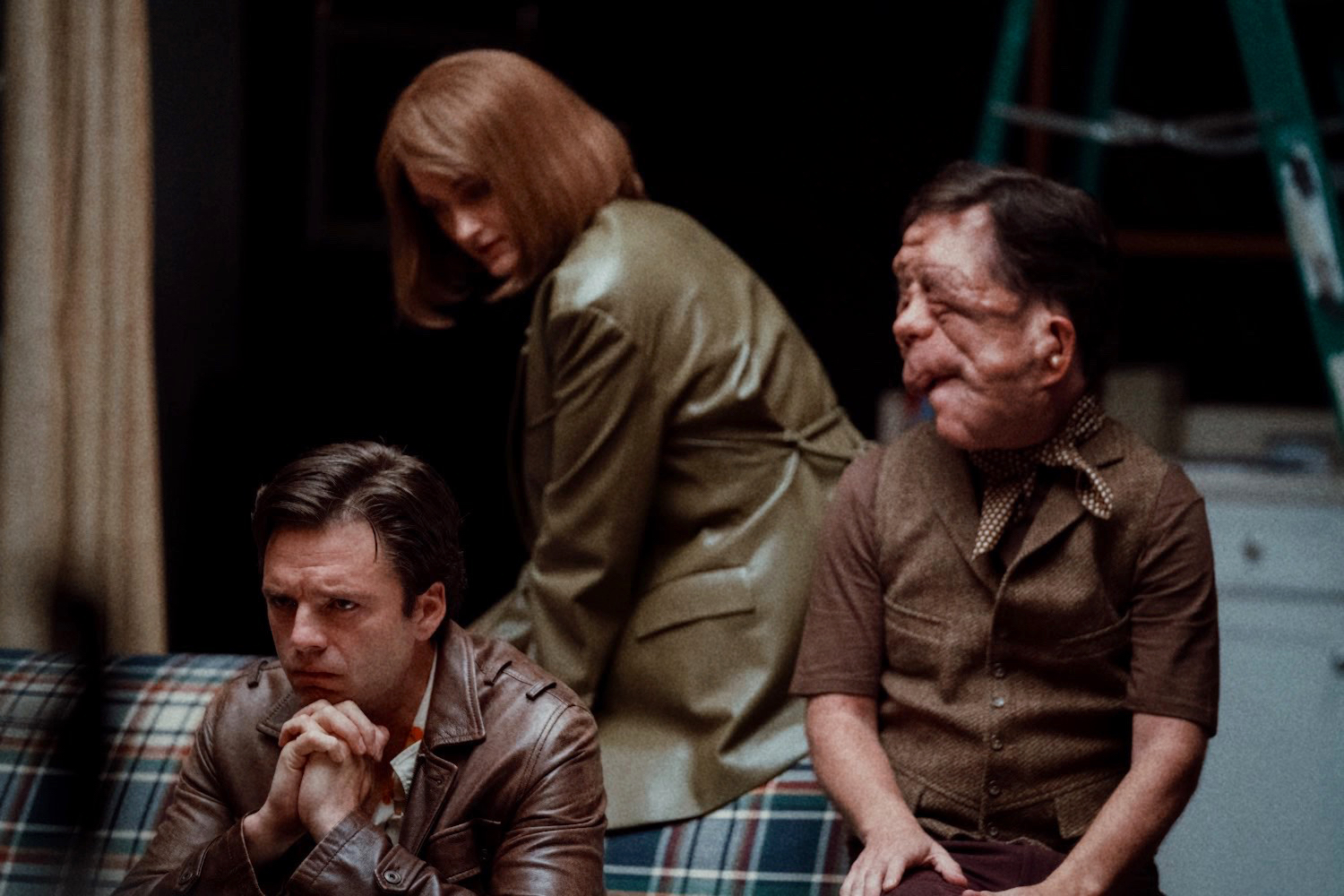Berlinale #4: Reinate Rensve conquers Berlin
 Monday, February 19, 2024 at 4:00PM
Monday, February 19, 2024 at 4:00PM by Elisa Giudici
 A DIFFERENT MAN © Faces Off LLC
A DIFFERENT MAN © Faces Off LLC
Watching her in Norway's international hit The Worst Person in the World (2021), it was clear that Renate Reinsve was destined for great things. Three years later, we find her at the Berlinale starring in two international films and shining brightly in both. Is it finally becoming easier for non-native English-speaking actors to break through internationally? It certainly seems so!
A DIFFERENT MAN by Aaron Schimberg
The title is cleverly crafted and the film has the potential to go far internationally. Writer/director Aaron Schimberg tackles a Lynchian theme (a man's facial deformity reflecting his inner self), and adds a touch of Kafka in a contemporary key. Despite the influences and references, he makes it entirely his own...
A Different Man has a distinctive character, despite some very well-worn tropes and uncomfortable precedents: the theme of duality, both internal and external monstrosity, with frequent visual forays into the absurd that nod to Ari Aster. [Side note: During this Berlinale, I've noticed several instances of Ari Aster already exerting a significant influence on contemporary cinema.]
Sebastian Stan made a wise decision to produce a film that gives him the part he needed to be taken seriously as a lead. With a certain generosity, he ends up playing second fiddle to his colleagues Renate Reinsve and Adam Pearson, grappling with two infinitely elusive and fascinating roles. Stan portrays Edward, an awkward man trapped in his life, trying not to let the serious facial deformity that afflicts him define him
Everything changes when he meets Ingrid (Renate Reinsve), a fascinating neighbor in Manhattan. She treats him with great familiarity and warmth, without any hint of pity or revulsion. Meanwhile, Edward stumbles upon an experimental treatment that literally melts away his old face, revealing Sebastian Stan's face. A radical, sudden change for sure.
However, A Different Man is interested in showing that Edward's extraordinary appearance wasn't the crux of his unfulfilled life. Unrecognizable, Edward rebuilds his life with a new identity, but it brings forth a different kind of unpleasantness and human banality. His attraction to Ingrid culminates in a relationship with bitter consequences: she writes a theater piece about his former self, and Edward slowly realizes how much misunderstanding and fetishism underpinned their relationship. Desperate, he convinces her to let him portray his former self in the play, which, however, is not (anymore) him; instead, it's a grotesque and victimized pantomime. The encounter/clash with "a different man," Oswald (Pearson), afflicted with the same facial deformity as his past, turns A Different Man into a dark comedy where the protagonist's doppelgänger mercilessly shows him all the qualities he has never possessed, even now that his deformity is gone.
 A DIFFERENT MAN © Faces Off LLC
A DIFFERENT MAN © Faces Off LLC
Sharp, brilliant, and very cheeky, A Different Man never puts a foot wrong, not even when indulging in some Kafkaesque visions (the strange pieces of meat dripping from Edward's apartment ceiling) to illustrate its point. It's also a very incisive reflection on the eternal dilemma of acting: to portray a character with such distinct physical or character specificity, is it right to resort to masks and makeup? Does the alternate approach that demands actors perfectly overlapped with their character in experience and quality stifle interpretative possibilities? With two actors playing characters with facial deformities—one with masks and makeup, the other with his own face—A Different Man probes this question deeply, like few films have done before.
Stan deserves a mention for "suffering" through the film as a character and actor, but actually delivers a great performance, somewhat overshadowed by the irresistible ambiguity of the other two supporting actors, who are also phenomenal. He has shown he deserves substantial roles, and as often happens, had to produce a film to make it happen. Maybe there is a future Oscar contender here?
 Reinate Rensve in ANOTHER END © Kimberley Ross / Indigo Film
Reinate Rensve in ANOTHER END © Kimberley Ross / Indigo Film
ANOTHER END by Piero Messina
Another End falls into that specific subgenre of sci-fi where a company develops futuristic technology that, at first glance, reads as a terrible and ethically intolerable idea. Yet it takes the protagonists the entire film to realize it.
In this case, the company in question is Aeterna, which offers people the opportunity to archive their memories in advance (the specifics of how, why, and when are not entirely clear). In the event of a sudden death that leaves loved ones devastated and traumatized, these memories are transferred to a host body of a consenting person, which returns to its family for a series of encounters where the grieving can bid farewell to the departed in a cathartic process. However, if "the absent one" realizes they are dead, they cannot be awakened again: Another End thus confronts a therapeutic, albeit deceptive, technique.
The movie ends up feeling ike an extended episode of Black Mirror. It has an intriguing premise but is unable to find a conclusion worthy of it. The last act is bungled enough that a fade to black was misunderstood as the actual ending, the audience applauded, got up to leave... and then the film resumed, hesitant and unable to find a clear ending.
 ANOTHER END © Matteo Casilli / Indigo Film
ANOTHER END © Matteo Casilli / Indigo Film
While Another End is unsuccessful as a whole, it has some truly commendable parts. Foremost among them is Renate Reinsve's dual performance. She first portrays the host body where Gael García Bernal's grieving character's dead wife resides, and then the person behind the host that the protagonist ends up falling in love with. Both characters are rooted in somewhat stereotypical roles, serving male perspectives in the story, yet Reinsve infuses them with palpable, unexpected humanity.
Another point worth noting is that, this film marks an important moment for Italian cinema. Italian cinema has struggled to break free from the dichotomy of commercial cinema versus art house films, often avoiding genre cinema, and rarely bothering to assemble an international cast. For this reason, Messina deserves praise: it's just unfortunate that the film doesn't leave a more lasting impact.



Reader Comments